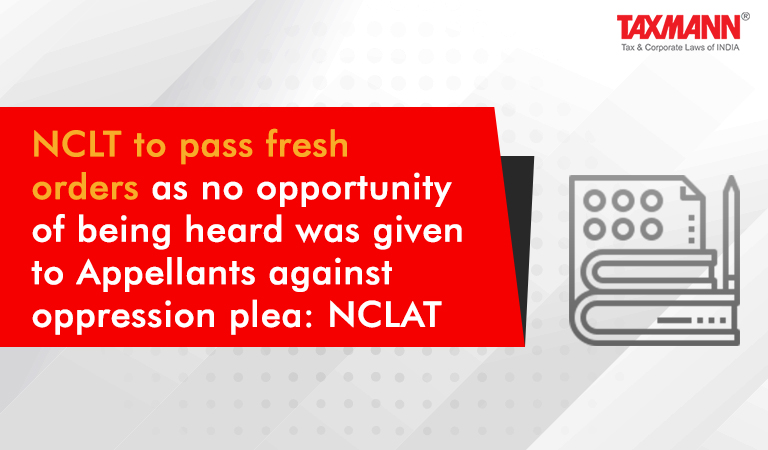NCLT to pass fresh orders as no opportunity of being heard was given to Appellants against oppression plea: NCLAT
- Blog|News|Company Law|
- 3 Min Read
- By Taxmann
- |
- Last Updated on 25 January, 2022

Case Review: Arvind Bali v. Union of India - [2022] 134 taxmann.com 90 (NCLAT- New Delhi)
Judiciary and Counsel Details
-
- Justice M. Venugopal, Actg. Chairperson
- V.P. Singh and Dr. Ashok Kumar Mishra, Technical Member
- S.N. Mookherjee, Jayant Mehta, Sr. Advs., Nakul Mohta and Ms. Misha Rohatgi Mohta, Akshansh Animesh and Devang Kumar, Advs. for the Appellant.
- Sanjay Shorey, (Director Legal, MCA), Rakesh Tiwari, (Joint Director), Ms. Rupa Sutar, Abhinav Vasisht, Sr. Advs., Ms. Meghna Rajadhyaksha, Vaijayant Paliwal, Anoop Rawat, Ms. Zeeshan Khan, Ms. Priya Singh, Ms. Moulshree Shukla, Ms. Radhika Indapurkar, Advs. for the Respondent.
Facts of the Case
In the instant case, Union of India (Hereinafter referred as ‘Respondent’) who had filed the company petition against key managerial personnel of company ‘V’ alleging oppression and mismanagement under section 241 of the Companies Act, 2013.
The Respondent later on, filed petitions for impleading appellants independent directed in said petition.
NCLT, by the impugned order, attached and froze the moveable and immovable properties of the appellants including Bank Accounts, Lockers, Demat Accounts including the jointly held properties.
The appellants challenged the ‘Ex-parte ‘interim order passed by the NCLT. The appellants submitted that the order was passed without providing a single ‘Opportunity of Hearing’ is per se an illegal one. Appellants further contended that they were not a party to the main petition and further, an interlocutory application for intervening was filed by the UOI, to implead the appellants and in the said application, no notice was issued to them.
The appellants also submitted that even the application was not even duly filed and registered, as there was an error in the petition filed by the Respondent for arraying the ‘Appellants’ as ‘Respondents’ yet the ‘Tribunal’ had passed the impugned order against the Appellants.
NCLAT Held
NCLAT held that the impugned order was an interim one, the appellants were permitted to file their response to the main company petition filed by the Respondent.
The NCLAT further ordered that NCLT is directed to pass necessary fresh recent orders in a fair, just, dispassionate manner on merits, afresh (because of the fact that there was a ‘negation of principles of natural justice’ in not adhering to the ‘National Company Law Tribunal’ Rules, 2016.
List of Cases Referred to
-
- B.D. Pawar v. Union of India, Through Ministry of Corporate Affairs [W.P. (Crl.) No. 1285 of 2020, dated 10-9-2020] (para 13)
- Gopal Krisshna Karunakaran Nair v. Union of India [Civil Appeal Nos. 7282-7283 of 2018, dated 13-11-2018] (para 15)
- Sujal Anil Shah v. Union of India [Civil Appeal Nos. 8731-8732 of 2018, dated 14-9-2018] (para 16)
- Raman Tech. & Process Engg. Co. v. Solanki Traders [2008] 2 SCC 302 (para 17)
- B.D. Pawar v. Union of India, Through Ministry of Corporate Affairs [W.P. (Crl.) 1285 of 2020, dated 2-8-2021] (para 21)
- Union of India v. Gitanjali Gems Ltd. [2018] 96 taxmann.com 487/149 SCL 495 (NCLAT – New Delhi) (para 22)
- Salim Akbarali Nanji v. Union of India [2006] 68 SCL 417 (SC) (para 23)
- Union of India v. Videocon Industries Ltd. [2021] 130 taxmann.com 52 (NCLT – Mum.) (para 28)
- State Bank of India v. Videocon Industries Ltd. [C.P. No. 2 of 2018, dated 8-8-2019] (para 34)
- 63 Moons Technologies Ltd. v. Union of India [2017] 80 taxmann.com 9/140 SCL 621 (NCL-AT) (para 37)
- Union of India v. W.N. Chadha AIR 1993 SC 1082 (para 39)
- Union of India v. J.N. Sinha AIR 1971 SC 40 (para 40)
- Asha Kiran v. Union of India [Civil Appeal Nos. 2765-2766 of 2020, dated 30-7-2020] (para 41)
- Padmini Technologies Ltd. v. Union of India [Co. (Appeal) No. 31 of 2005, dated 20-12-2006] (para 42)
- Chandrashekhar Ashok Nagarkar v. Union of India [W.P. No. 21058 of 2021, dated 27-9-2021] (para 43)
- Major General Sudhir Chintamani Nilakanth Jathar v. Union of India [W.P. No. 20882 of 2021, dated 31-8-2021] (para 43).
Disclaimer: The content/information published on the website is only for general information of the user and shall not be construed as legal advice. While the Taxmann has exercised reasonable efforts to ensure the veracity of information/content published, Taxmann shall be under no liability in any manner whatsoever for incorrect information, if any.

Taxmann Publications has a dedicated in-house Research & Editorial Team. This team consists of a team of Chartered Accountants, Company Secretaries, and Lawyers. This team works under the guidance and supervision of editor-in-chief Mr Rakesh Bhargava.
The Research and Editorial Team is responsible for developing reliable and accurate content for the readers. The team follows the six-sigma approach to achieve the benchmark of zero error in its publications and research platforms. The team ensures that the following publication guidelines are thoroughly followed while developing the content:
- The statutory material is obtained only from the authorized and reliable sources
- All the latest developments in the judicial and legislative fields are covered
- Prepare the analytical write-ups on current, controversial, and important issues to help the readers to understand the concept and its implications
- Every content published by Taxmann is complete, accurate and lucid
- All evidence-based statements are supported with proper reference to Section, Circular No., Notification No. or citations
- The golden rules of grammar, style and consistency are thoroughly followed
- Font and size that’s easy to read and remain consistent across all imprint and digital publications are applied



 CA | CS | CMA
CA | CS | CMA
